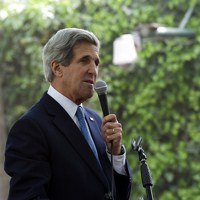A few days after sitting across from an Iranian delegation in Geneva, U.S. Secretary of State John Kerry is facing another daunting interlocutor as he buys time for the administration’s diplomatic approach: the U.S. Congress. Kerry made the case for a pause in additional sanctions at an off-the-record Senate Banking Committee briefing on Wednesday.
Although the exact details have not been publicly disclosed of last week’s negotiations between Iran and the U.S.—in coordination with the other members of the Security Council and Germany—the proposed agreement reportedly contains some form of sanctions relief for Iran and other inducements in return for limits on Iran’s uranium stocks and centrifuges. Other issues include Iran’s “right” to enrichment and the status of the Arak plutonium plant. The negotiations ended without an agreement, but with a plan to reconvene on Nov. 20.
Back in Washington, the congressional politics of sanctions relief will be difficult, with lawmakers in both parties pushing for additional sanctions. As Jim Phillips of the Heritage Foundation explained in an email interview, a “bipartisan consensus” exists that any deal must close the Fordow and Arak facilities, halt 20 percent uranium enrichment, ship existing 20 percent stocks out of the country and place “strict limits” on Iranian centrifuges, as well as provide for “much more intrusive inspections.” And while congressional Democrats may be more open to administration requests, “a bipartisan majority would criticize any weakening of existing sanctions.” At present, as Robert Zarate of the Foreign Policy Initiative said this week in an email, the deal under discussion “appears to do nothing to halt, let alone roll back, Iran’s growing inventory of low enriched uranium and enrichment centrifuges.”

